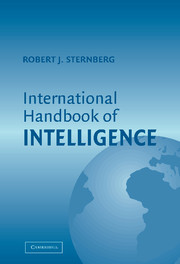Book contents
- Frontmatter
- Contents
- List of Contributors
- Preface
- 1 Intelligence Research and Assessment in the United Kingdom
- 2 Intelligence – Theory, Research, and Testing in the Nordic Countries
- 3 The Psychology of Human Intelligence in Spain
- 4 Psychology of Human Intelligence in France and French-Speaking Switzerland
- 5 Research on Intelligence in German-Speaking Countries
- 6 Is It Possible to Study Intelligence Without Using the Concept of Intelligence? An Example from Soviet/Russian Psychology
- 7 Intelligence Theory, Assessment, and Research: The Israeli Experience
- 8 Intelligence and Intelligence Testing in Turkey
- 9 Intelligence: What Is Indigenous to India and What Is Shared?
- 10 Japanese Conception of and Research on Human Intelligence
- 11 Diligence Makes People Smart: Chinese Perspectives of Intelligence
- 12 Similar Thoughts under Different Stars: Conceptions of Intelligence in Australia
- 13 Being Intelligent with Zimbabweans: A Historical and Contemporary View
- 14 Intelligence Research in Latin America
- 15 North American Approaches to Intelligence
- 16 Human Intelligence: From Local Models to Universal Theory
- Index
- References
16 - Human Intelligence: From Local Models to Universal Theory
Published online by Cambridge University Press: 05 June 2012
- Frontmatter
- Contents
- List of Contributors
- Preface
- 1 Intelligence Research and Assessment in the United Kingdom
- 2 Intelligence – Theory, Research, and Testing in the Nordic Countries
- 3 The Psychology of Human Intelligence in Spain
- 4 Psychology of Human Intelligence in France and French-Speaking Switzerland
- 5 Research on Intelligence in German-Speaking Countries
- 6 Is It Possible to Study Intelligence Without Using the Concept of Intelligence? An Example from Soviet/Russian Psychology
- 7 Intelligence Theory, Assessment, and Research: The Israeli Experience
- 8 Intelligence and Intelligence Testing in Turkey
- 9 Intelligence: What Is Indigenous to India and What Is Shared?
- 10 Japanese Conception of and Research on Human Intelligence
- 11 Diligence Makes People Smart: Chinese Perspectives of Intelligence
- 12 Similar Thoughts under Different Stars: Conceptions of Intelligence in Australia
- 13 Being Intelligent with Zimbabweans: A Historical and Contemporary View
- 14 Intelligence Research in Latin America
- 15 North American Approaches to Intelligence
- 16 Human Intelligence: From Local Models to Universal Theory
- Index
- References
Summary
This book is unique in the sense that it provides a synopsis, that is, a comprehensive and concise picture of the history and current theory, research, and practice in the field of the psychology of intelligence all over the globe. To study the universal picture of the psychology of intelligence is a worthy task for at least two profound reasons: First, after more than a century, any single definition of intelligence may be still problematic; to study, therefore, the theoretical constructs relevant to the definition of intelligence around the globe appears to be an imperative task. Second, there has been significant progress in the study of intelligence, and the content of this book reflects this progress. For example, perhaps one of the most important advances we have made in recent years is to recognize that intelligence is not a unitary phenomenon but a complex set of functions dependent on many underlying processes. This advance alone brings up new debates.
Thus, this book is very practical for both epistemological and practical reasons. From the epistemological point of view, the book may be used to evaluate how the development of the field of intelligence spread from one country to another, influencing the relevant research accordingly. In fact, in the case of psychology students, this book may provide adequate information with regard to how a very strong theoretical and research tradition, which originated about a century ago in few of the European countries, such as France and Britain, was transferred and developed in other European countries and other continents.
Information
- Type
- Chapter
- Information
- International Handbook of Intelligence , pp. 445 - 474Publisher: Cambridge University PressPrint publication year: 2004
References
Accessibility standard: Unknown
Why this information is here
This section outlines the accessibility features of this content - including support for screen readers, full keyboard navigation and high-contrast display options. This may not be relevant for you.Accessibility Information
- 2
- Cited by
